Male Gaze and Oedipus Complex: A Psychological Analysis of Psycho
VerifiedAdded on 2023/06/12
|5
|1042
|297
Essay
AI Summary
This essay provides a psychological analysis of Alfred Hitchcock's film 'Psycho,' focusing on the concept of the male gaze as defined by Laura Mulvey and the Oedipus complex as theorized by Sigmund Freud. The analysis explores how Norman Bates' voyeuristic behavior and sexualization of Marion Crane exemplify the male gaze, portraying women as passive objects of male desire. It further examines Norman's unresolved Oedipus complex, stemming from his domineering relationship with his mother, which leads to his split personality and violent actions. The essay argues that Norman's upbringing and repressed sexuality contribute to his sociopathic behavior, while also critiquing the film's potential portrayal of independent women as victims. The conclusion emphasizes the film's significance in illustrating psychological theories through cinematic techniques, creating an atmosphere of fear, sexual perversity, and lust.
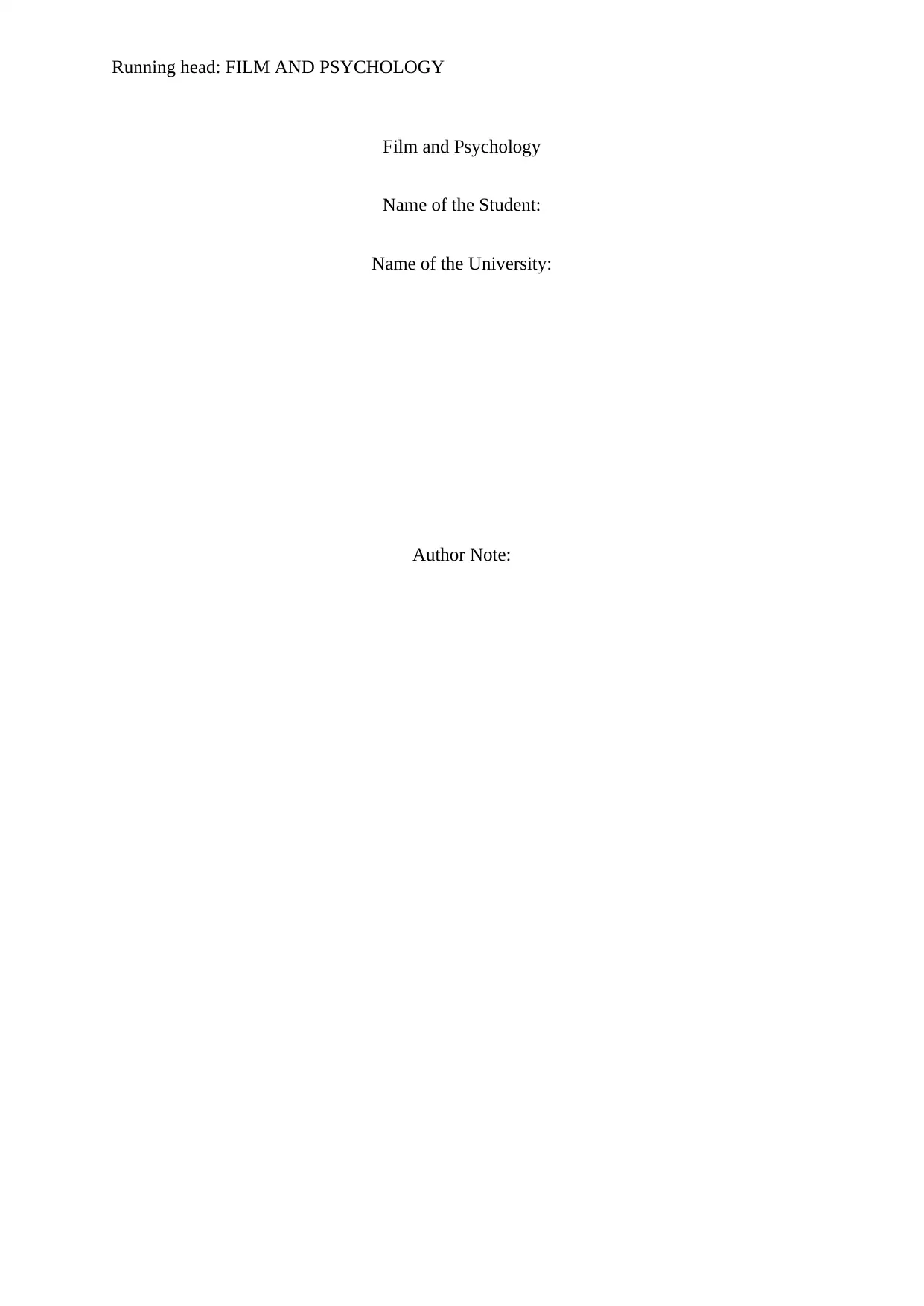
Running head: FILM AND PSYCHOLOGY
Film and Psychology
Name of the Student:
Name of the University:
Author Note:
Film and Psychology
Name of the Student:
Name of the University:
Author Note:
Paraphrase This Document
Need a fresh take? Get an instant paraphrase of this document with our AI Paraphraser
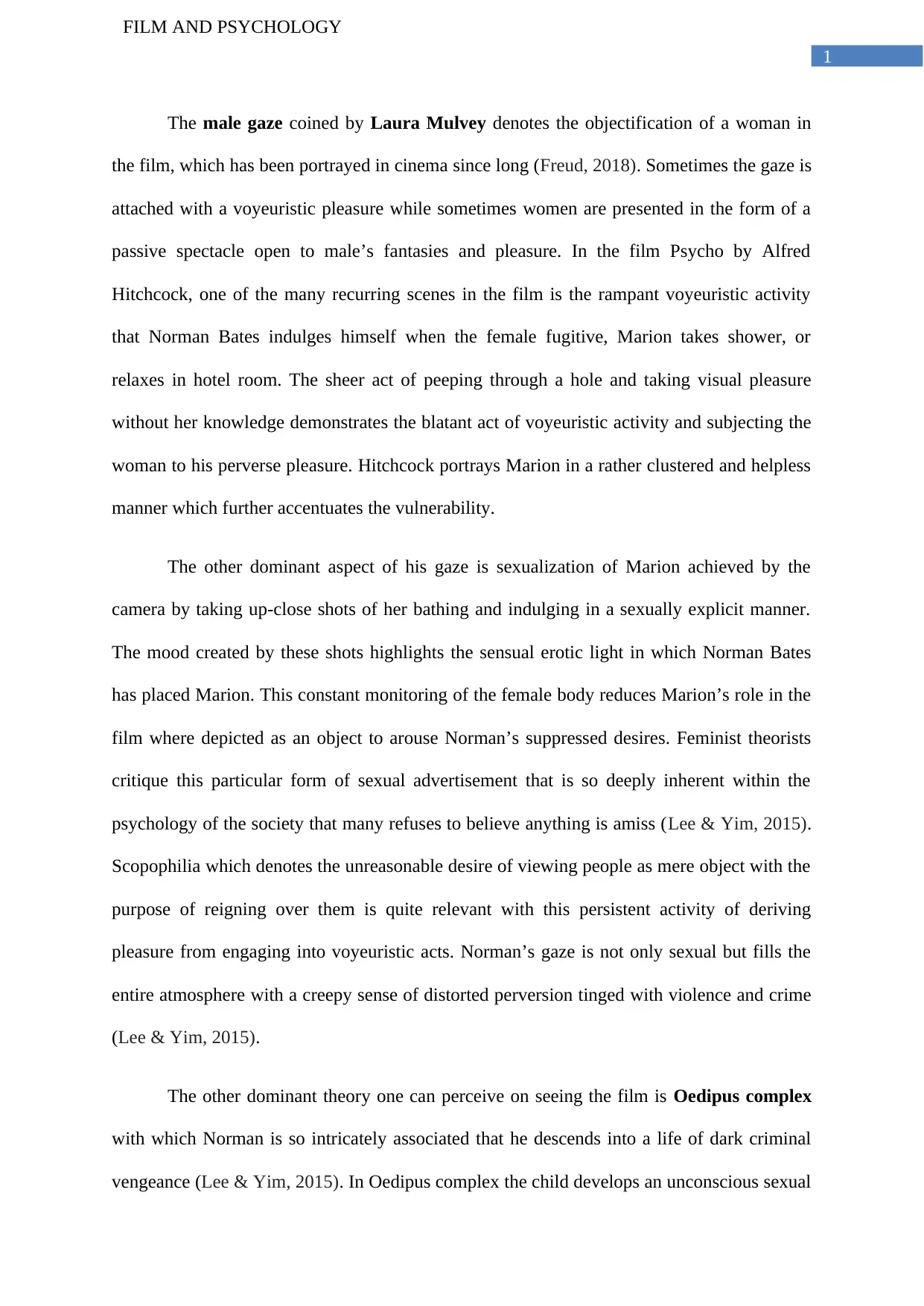
1
FILM AND PSYCHOLOGY
The male gaze coined by Laura Mulvey denotes the objectification of a woman in
the film, which has been portrayed in cinema since long (Freud, 2018). Sometimes the gaze is
attached with a voyeuristic pleasure while sometimes women are presented in the form of a
passive spectacle open to male’s fantasies and pleasure. In the film Psycho by Alfred
Hitchcock, one of the many recurring scenes in the film is the rampant voyeuristic activity
that Norman Bates indulges himself when the female fugitive, Marion takes shower, or
relaxes in hotel room. The sheer act of peeping through a hole and taking visual pleasure
without her knowledge demonstrates the blatant act of voyeuristic activity and subjecting the
woman to his perverse pleasure. Hitchcock portrays Marion in a rather clustered and helpless
manner which further accentuates the vulnerability.
The other dominant aspect of his gaze is sexualization of Marion achieved by the
camera by taking up-close shots of her bathing and indulging in a sexually explicit manner.
The mood created by these shots highlights the sensual erotic light in which Norman Bates
has placed Marion. This constant monitoring of the female body reduces Marion’s role in the
film where depicted as an object to arouse Norman’s suppressed desires. Feminist theorists
critique this particular form of sexual advertisement that is so deeply inherent within the
psychology of the society that many refuses to believe anything is amiss (Lee & Yim, 2015).
Scopophilia which denotes the unreasonable desire of viewing people as mere object with the
purpose of reigning over them is quite relevant with this persistent activity of deriving
pleasure from engaging into voyeuristic acts. Norman’s gaze is not only sexual but fills the
entire atmosphere with a creepy sense of distorted perversion tinged with violence and crime
(Lee & Yim, 2015).
The other dominant theory one can perceive on seeing the film is Oedipus complex
with which Norman is so intricately associated that he descends into a life of dark criminal
vengeance (Lee & Yim, 2015). In Oedipus complex the child develops an unconscious sexual
FILM AND PSYCHOLOGY
The male gaze coined by Laura Mulvey denotes the objectification of a woman in
the film, which has been portrayed in cinema since long (Freud, 2018). Sometimes the gaze is
attached with a voyeuristic pleasure while sometimes women are presented in the form of a
passive spectacle open to male’s fantasies and pleasure. In the film Psycho by Alfred
Hitchcock, one of the many recurring scenes in the film is the rampant voyeuristic activity
that Norman Bates indulges himself when the female fugitive, Marion takes shower, or
relaxes in hotel room. The sheer act of peeping through a hole and taking visual pleasure
without her knowledge demonstrates the blatant act of voyeuristic activity and subjecting the
woman to his perverse pleasure. Hitchcock portrays Marion in a rather clustered and helpless
manner which further accentuates the vulnerability.
The other dominant aspect of his gaze is sexualization of Marion achieved by the
camera by taking up-close shots of her bathing and indulging in a sexually explicit manner.
The mood created by these shots highlights the sensual erotic light in which Norman Bates
has placed Marion. This constant monitoring of the female body reduces Marion’s role in the
film where depicted as an object to arouse Norman’s suppressed desires. Feminist theorists
critique this particular form of sexual advertisement that is so deeply inherent within the
psychology of the society that many refuses to believe anything is amiss (Lee & Yim, 2015).
Scopophilia which denotes the unreasonable desire of viewing people as mere object with the
purpose of reigning over them is quite relevant with this persistent activity of deriving
pleasure from engaging into voyeuristic acts. Norman’s gaze is not only sexual but fills the
entire atmosphere with a creepy sense of distorted perversion tinged with violence and crime
(Lee & Yim, 2015).
The other dominant theory one can perceive on seeing the film is Oedipus complex
with which Norman is so intricately associated that he descends into a life of dark criminal
vengeance (Lee & Yim, 2015). In Oedipus complex the child develops an unconscious sexual
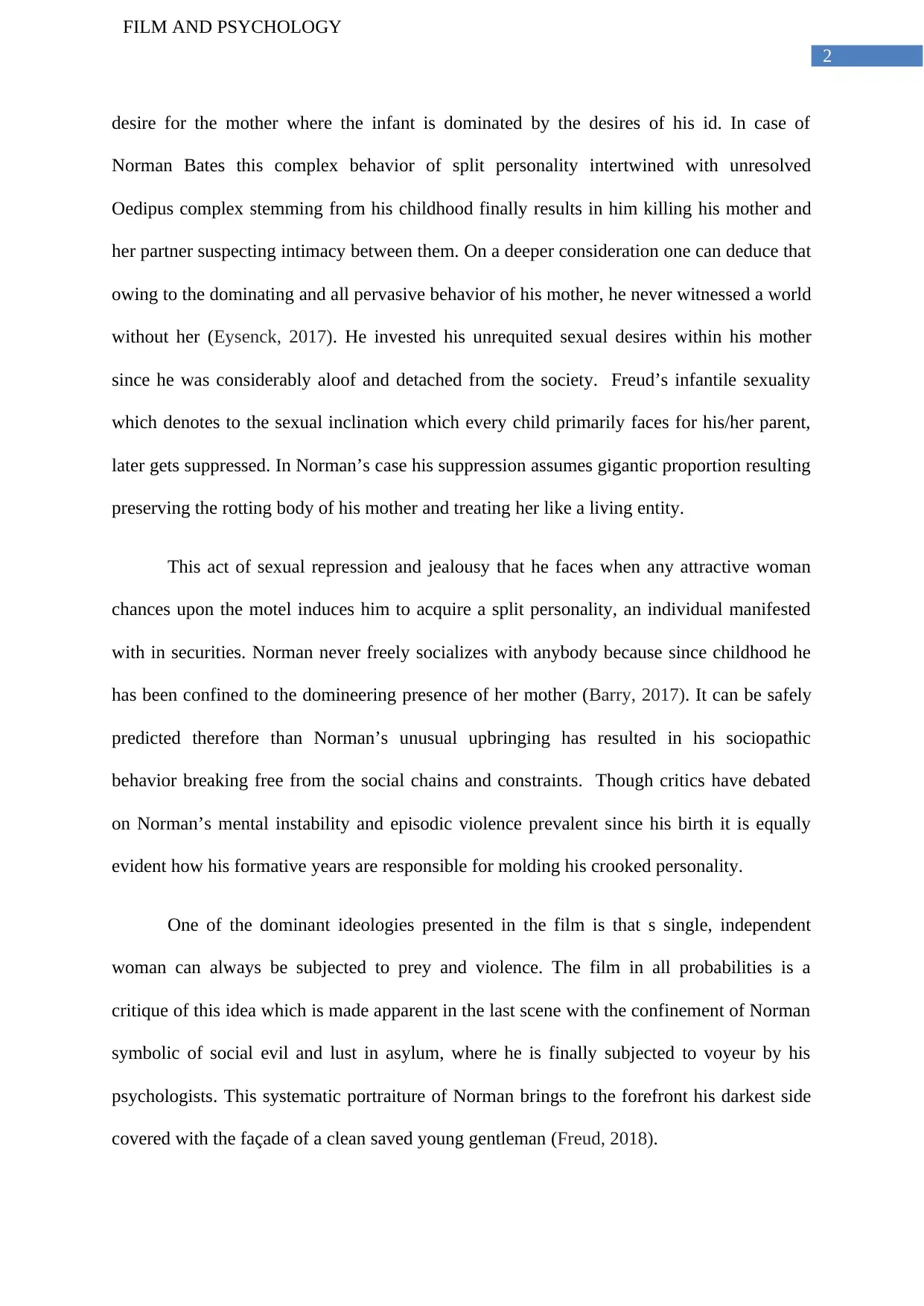
2
FILM AND PSYCHOLOGY
desire for the mother where the infant is dominated by the desires of his id. In case of
Norman Bates this complex behavior of split personality intertwined with unresolved
Oedipus complex stemming from his childhood finally results in him killing his mother and
her partner suspecting intimacy between them. On a deeper consideration one can deduce that
owing to the dominating and all pervasive behavior of his mother, he never witnessed a world
without her (Eysenck, 2017). He invested his unrequited sexual desires within his mother
since he was considerably aloof and detached from the society. Freud’s infantile sexuality
which denotes to the sexual inclination which every child primarily faces for his/her parent,
later gets suppressed. In Norman’s case his suppression assumes gigantic proportion resulting
preserving the rotting body of his mother and treating her like a living entity.
This act of sexual repression and jealousy that he faces when any attractive woman
chances upon the motel induces him to acquire a split personality, an individual manifested
with in securities. Norman never freely socializes with anybody because since childhood he
has been confined to the domineering presence of her mother (Barry, 2017). It can be safely
predicted therefore than Norman’s unusual upbringing has resulted in his sociopathic
behavior breaking free from the social chains and constraints. Though critics have debated
on Norman’s mental instability and episodic violence prevalent since his birth it is equally
evident how his formative years are responsible for molding his crooked personality.
One of the dominant ideologies presented in the film is that s single, independent
woman can always be subjected to prey and violence. The film in all probabilities is a
critique of this idea which is made apparent in the last scene with the confinement of Norman
symbolic of social evil and lust in asylum, where he is finally subjected to voyeur by his
psychologists. This systematic portraiture of Norman brings to the forefront his darkest side
covered with the façade of a clean saved young gentleman (Freud, 2018).
FILM AND PSYCHOLOGY
desire for the mother where the infant is dominated by the desires of his id. In case of
Norman Bates this complex behavior of split personality intertwined with unresolved
Oedipus complex stemming from his childhood finally results in him killing his mother and
her partner suspecting intimacy between them. On a deeper consideration one can deduce that
owing to the dominating and all pervasive behavior of his mother, he never witnessed a world
without her (Eysenck, 2017). He invested his unrequited sexual desires within his mother
since he was considerably aloof and detached from the society. Freud’s infantile sexuality
which denotes to the sexual inclination which every child primarily faces for his/her parent,
later gets suppressed. In Norman’s case his suppression assumes gigantic proportion resulting
preserving the rotting body of his mother and treating her like a living entity.
This act of sexual repression and jealousy that he faces when any attractive woman
chances upon the motel induces him to acquire a split personality, an individual manifested
with in securities. Norman never freely socializes with anybody because since childhood he
has been confined to the domineering presence of her mother (Barry, 2017). It can be safely
predicted therefore than Norman’s unusual upbringing has resulted in his sociopathic
behavior breaking free from the social chains and constraints. Though critics have debated
on Norman’s mental instability and episodic violence prevalent since his birth it is equally
evident how his formative years are responsible for molding his crooked personality.
One of the dominant ideologies presented in the film is that s single, independent
woman can always be subjected to prey and violence. The film in all probabilities is a
critique of this idea which is made apparent in the last scene with the confinement of Norman
symbolic of social evil and lust in asylum, where he is finally subjected to voyeur by his
psychologists. This systematic portraiture of Norman brings to the forefront his darkest side
covered with the façade of a clean saved young gentleman (Freud, 2018).
⊘ This is a preview!⊘
Do you want full access?
Subscribe today to unlock all pages.

Trusted by 1+ million students worldwide
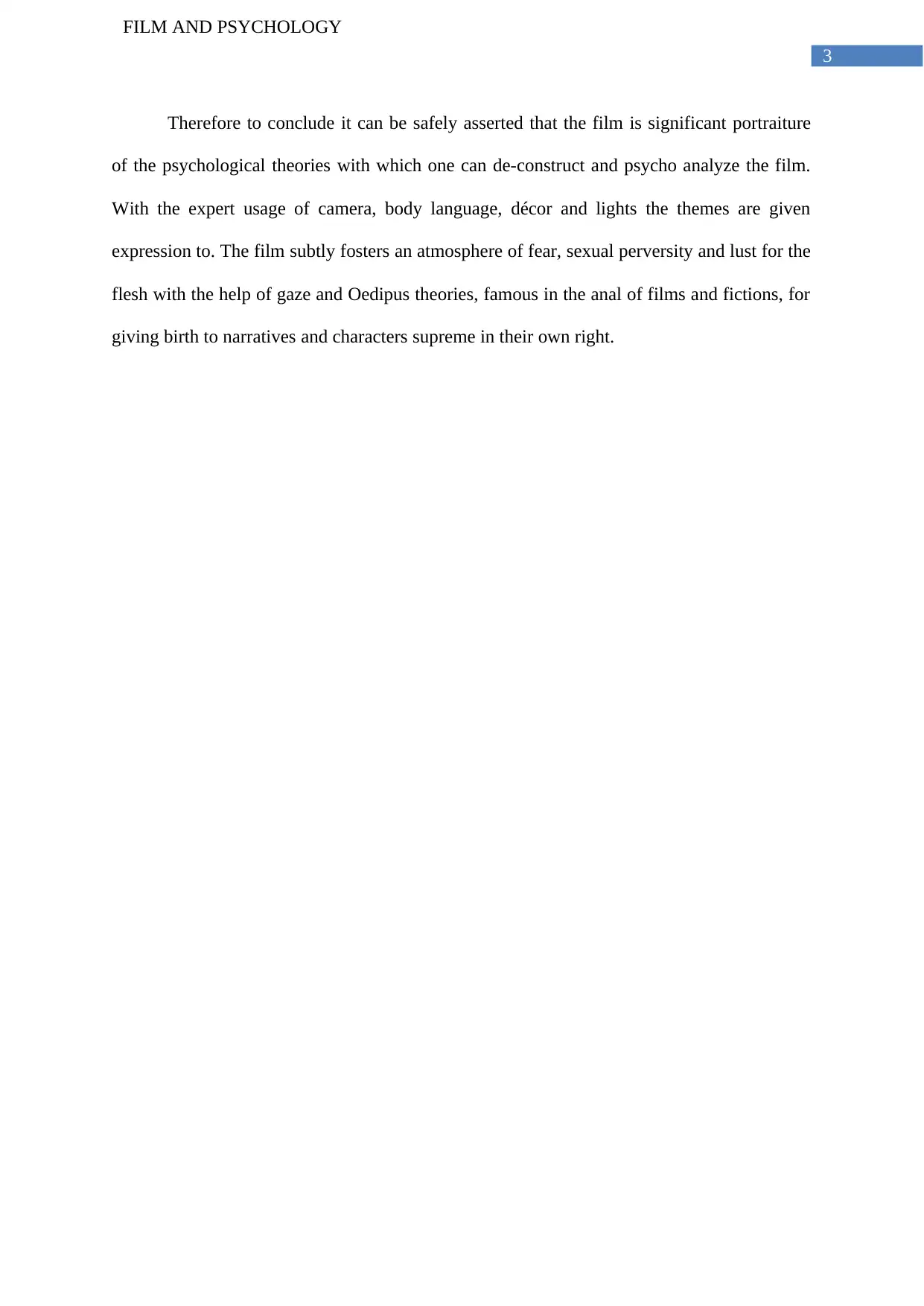
3
FILM AND PSYCHOLOGY
Therefore to conclude it can be safely asserted that the film is significant portraiture
of the psychological theories with which one can de-construct and psycho analyze the film.
With the expert usage of camera, body language, décor and lights the themes are given
expression to. The film subtly fosters an atmosphere of fear, sexual perversity and lust for the
flesh with the help of gaze and Oedipus theories, famous in the anal of films and fictions, for
giving birth to narratives and characters supreme in their own right.
FILM AND PSYCHOLOGY
Therefore to conclude it can be safely asserted that the film is significant portraiture
of the psychological theories with which one can de-construct and psycho analyze the film.
With the expert usage of camera, body language, décor and lights the themes are given
expression to. The film subtly fosters an atmosphere of fear, sexual perversity and lust for the
flesh with the help of gaze and Oedipus theories, famous in the anal of films and fictions, for
giving birth to narratives and characters supreme in their own right.
Paraphrase This Document
Need a fresh take? Get an instant paraphrase of this document with our AI Paraphraser
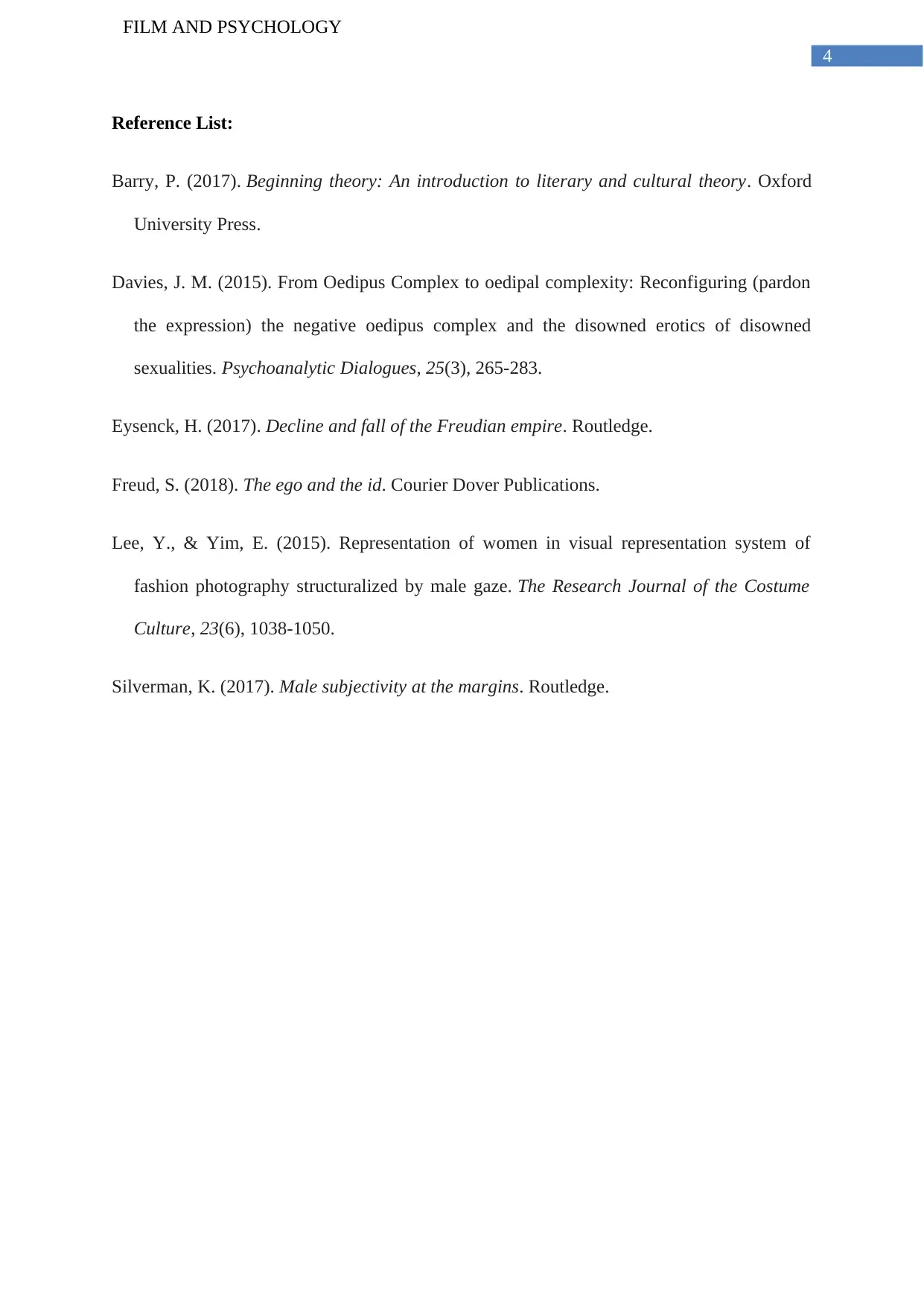
4
FILM AND PSYCHOLOGY
Reference List:
Barry, P. (2017). Beginning theory: An introduction to literary and cultural theory. Oxford
University Press.
Davies, J. M. (2015). From Oedipus Complex to oedipal complexity: Reconfiguring (pardon
the expression) the negative oedipus complex and the disowned erotics of disowned
sexualities. Psychoanalytic Dialogues, 25(3), 265-283.
Eysenck, H. (2017). Decline and fall of the Freudian empire. Routledge.
Freud, S. (2018). The ego and the id. Courier Dover Publications.
Lee, Y., & Yim, E. (2015). Representation of women in visual representation system of
fashion photography structuralized by male gaze. The Research Journal of the Costume
Culture, 23(6), 1038-1050.
Silverman, K. (2017). Male subjectivity at the margins. Routledge.
FILM AND PSYCHOLOGY
Reference List:
Barry, P. (2017). Beginning theory: An introduction to literary and cultural theory. Oxford
University Press.
Davies, J. M. (2015). From Oedipus Complex to oedipal complexity: Reconfiguring (pardon
the expression) the negative oedipus complex and the disowned erotics of disowned
sexualities. Psychoanalytic Dialogues, 25(3), 265-283.
Eysenck, H. (2017). Decline and fall of the Freudian empire. Routledge.
Freud, S. (2018). The ego and the id. Courier Dover Publications.
Lee, Y., & Yim, E. (2015). Representation of women in visual representation system of
fashion photography structuralized by male gaze. The Research Journal of the Costume
Culture, 23(6), 1038-1050.
Silverman, K. (2017). Male subjectivity at the margins. Routledge.
1 out of 5
Your All-in-One AI-Powered Toolkit for Academic Success.
+13062052269
info@desklib.com
Available 24*7 on WhatsApp / Email
![[object Object]](/_next/static/media/star-bottom.7253800d.svg)
Unlock your academic potential
Copyright © 2020–2026 A2Z Services. All Rights Reserved. Developed and managed by ZUCOL.